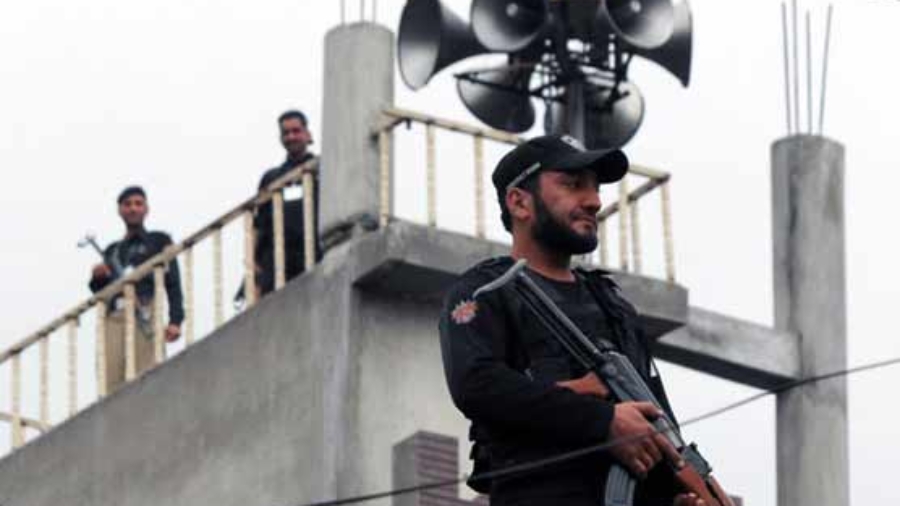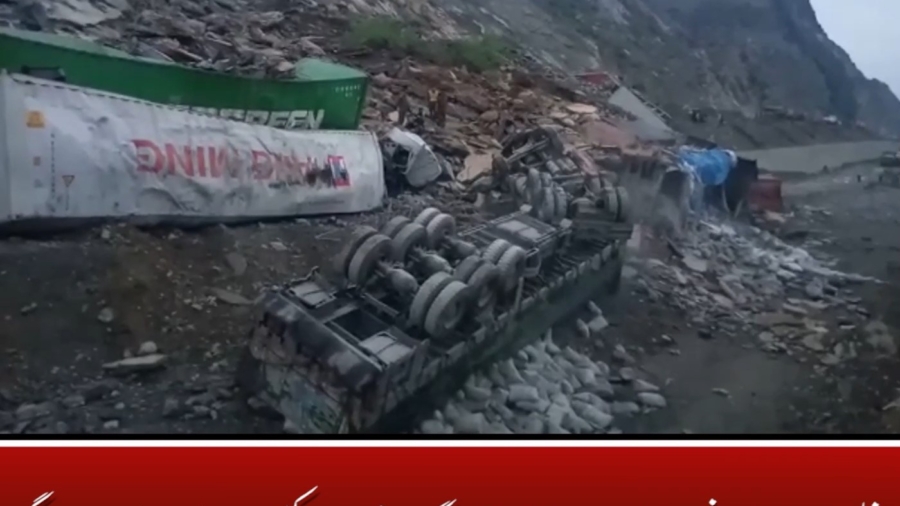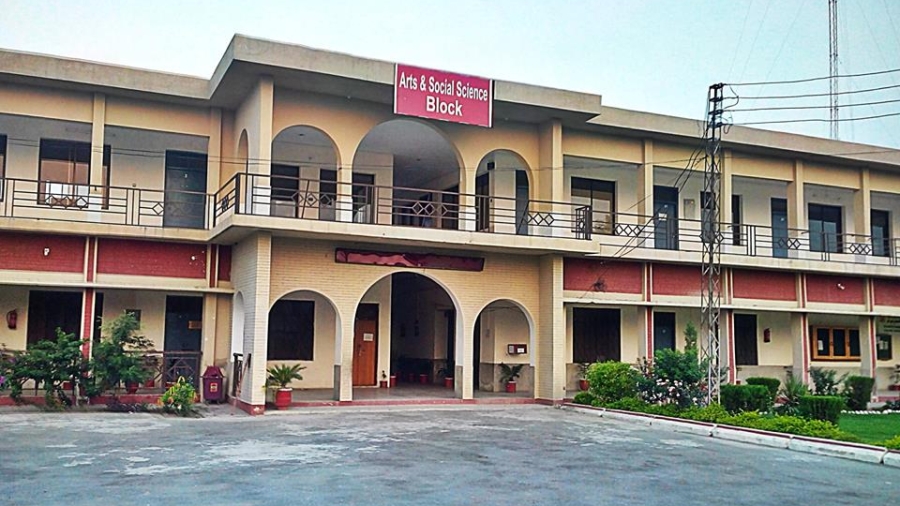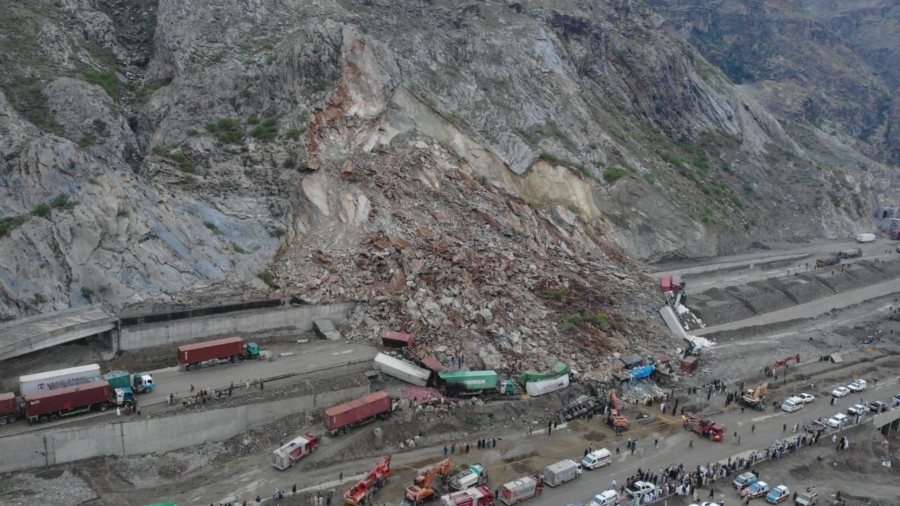پشاور: صحافیوں کے لئے سجا رمضان سپورٹس گالا اختتام پذیر

پشاور: صحافیوں کے لئے سجا رمضان سپورٹس گالا اپنی تمام تر رعنائیوں کیساتھ اختتام پذیر ہوگیا،گزشتہ شب پشاور پریس کلب میں ایک پروقار اختتامی تقریب کا انعقاد کیا گیا جس کے مہمان خصوصی آئی جی پی خیبر پختونخوا اختر حیات خان گنڈاپور تھے جنہوں نے جیتنے والے صحافیوں میں انعامات تقسیم کئے۔
پشاور پریس کلب اور غیر سرکاری تنظیم ہوپ کے زیر اہتمام منعقدہ رمضان سپورٹس گالا اختتام پزیر ہوگیا سپورٹس گالا میں دو خواتین کے جبکہ پانچ مردوں کے مقابلے شامل تھے،خواتین کے کیرم بورڈ کے ایونٹ میں انیلہ شاہین اور شائستہ تسلیم نے پہلی جبکہ سلمہ جہانگیر اور نائیلہ نے دوسری پوزیشن حاصل کرلی اسی طرح لڈو میں انیلہ شاہین نے گولڈ جبکہ اسماء بصیر نے سلور میڈل اپنے نام کرلیا،مردوں کے بیڈمنٹن کے فائنل میں عرفان موسیٰ زئی اور محمد علی شیخ نے ظفر اقبال اور عابد خان کی ٹیم کو 1-2 سے شکست دے کر برتری حاصل کر لی۔
سنوکر کا فائنل طیب عثمان اور ذیشان لیاقت کے مابین کھیلا گیا جس میں طیب عثمان نے کامیابی حاصل کرلی اسی طرح ٹیبل ٹینس کے فائنل میچ میں محمد علی شیخ نے عابد خان کو دو کے مقابلے میں تین پوائنٹس سے شکست دے کر ٹرافی اپنے نام کرلی،لڈو کے فائنل میں ارشاد میدانی نے نادر خواجہ کو ہرا کر برتری حاصل کرلی۔کیرم بورڈ کے ایونٹ میں ذولفقار چاچا نے سفیر احمد کو شکست دے کر فتح حاصل کرلی اسی طرح سینئر بیڈمنٹن چیمپئن شپ کے فائنل میں ارشد عزیز ملک نے شہاب الدین کو دو ایک سے شکست دے کر فائنل جیت لیا۔
اختتامی تقریب سے خطاب کرتے ہوئے مہمان خصوصی انسپکٹر جنرل پولیس خیبر پختونخوا اختر حیات گنڈا پور نے کہا کہ پشاور کے صحافیوں نے بڑے مشکل حالات دیکھے ہیں اور اس مشکل دور میں بھی صحافی برادری نے اپنی فرائض باخوبی سر انجام دینے میں کوئی کسر نہیں چھوڑی اور صوبے کا سافٹ امیج دنیا کو دیکھایا انہوں نے کہا کہ سپورٹس ہمیں ذہنی اور جسمانی نشونما کیساتھ ساتھ زندگی گزارنے کے اصول اور آگے بڑھنے کا حوصلہ دیتی ہے۔ان کا کہنا تھا کہ رمضان کے مہینے میں شام کے بعد اس طرح صحت مندانہ سرگرمیوں میں کثیر تعداد میں شرکت کرنا اور خواتین کے لئے بھی گیمز کا انعقاد کرنا قابل تحسین ہے،واضح رہے کہ رمضان سپورٹس گالا میں 150 مرد و خواتین صحافیوں نے پانچ مختلف گیمز جس میں بیڈمنٹن،ٹیبل ٹینس،سنوکر،لڈو اور کیرم بورڈ شامل ہیں میں بھر پور شرکت کی۔
پشاور میں عید الفطر کے موقع پر دفعہ 144 نافذ
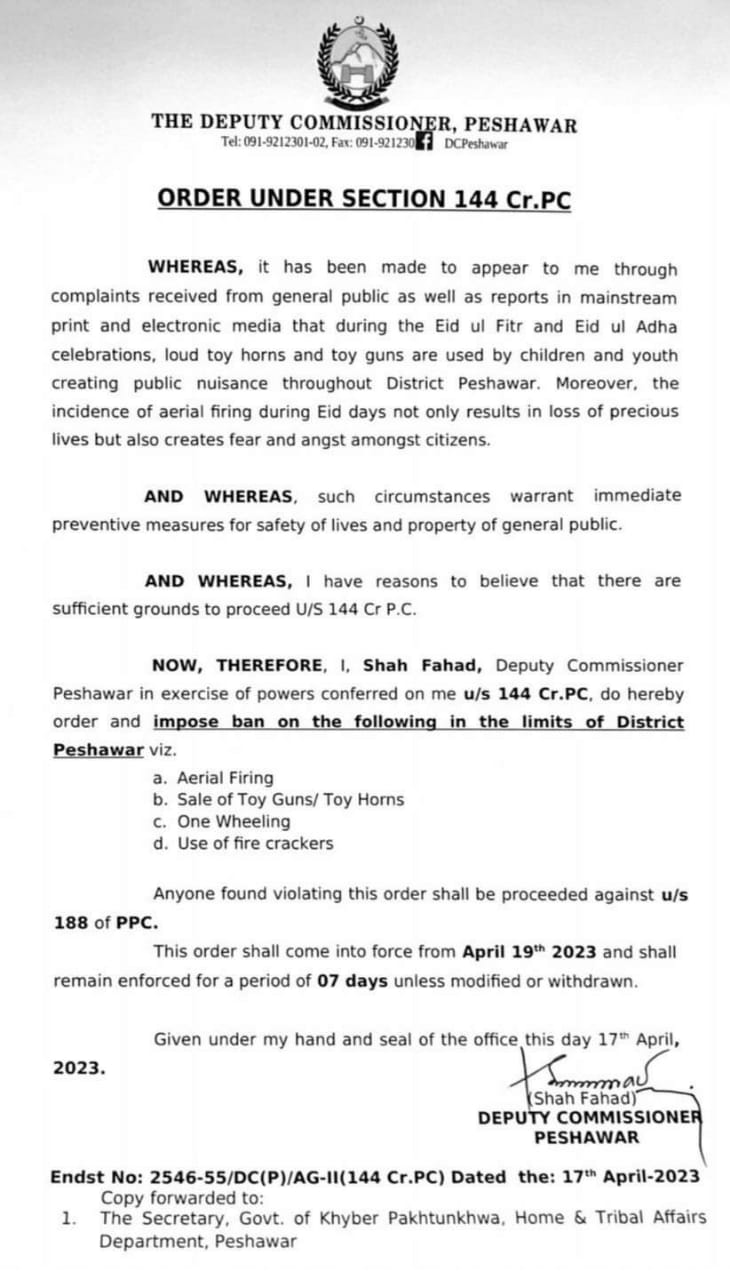
پشاور :ضلعی انتظامیہ نےعید الفطر کے موقع پر شہر بھر میں دفعہ 144 نافذ کردی ہے۔
انتظامیہ نے شہر بھر میں عید الفطر کے دوران ہوائی فائرنگ، ون ویلنگ اور کھلونا بندوق کے استعمال پر پابندی عائد کردی گئی ہے۔
اس حوالے سے نوٹیفکیشن میں کہا گیا ہے کہ 19 اپریل سے 7 روز کیلئے شہر بھر میں دفعہ 144 نافذ رہے گی۔ اس دوران ہوائی فائرنگ، موٹر سائیکل کی ون ویلنگ، کھلونا بندوق کی خرید و فروخت اور آتش بازی پر مکمل پابندی ہوگی۔
نوٹیفکیشن کے مطابق پابندی کی خلاف ورزی کرنیوالوں کیخلاف سخت قانونی کارروائی کی جائے گی، اس حوالے دیگر اداروں کو ہدایات جاری کردی گئی ہیں۔
باچا خا ن یو نیو رسٹی چارسدہ نے ایم اے پرائیویٹ امتحانات کے نتائج کا اعلان کردیا
پشاور: باچا خا ن یو نیو رسٹی چارسدہ نے ایم اے پرائیویٹ امتحانات کے نتائج کا اعلان کردیا ہے۔ وائس چانسلر میریٹوریس پروفیسر ڈاکٹر بشیر احمد نے نتا ئج پر دستخط کئے۔
ان امتحانات میں کل5577سے زائد پرائیویٹ طلباء و طالبات نے حصہ لیا جن میں سے 3110 طلبہ پاس ہوئے اور اس طرح نتیجہ کی شرح 55.76 فیصد رہی۔
وائس چانسلر پروفیسرڈاکٹر بشیر احمد نے اس موقع پر کہا کہ شعبہ امتحانات کے تمام عملہ نے انتھک محنت کرکے مختصر ترین وقت میں نتائج مرتب کئے جس پر انہوں نے شعبہ امتحانات کے تمام عملے کا شکریہ ادا کیا اور شاباش دی۔کنٹرولر امتحانات ڈاکٹر سید ارشد علی شاہ کے مطابق تمام امیدواران اپنی ڈی ایم سیزعید کے بعد باچا خا ن یونیورسٹی کے مین گیٹ پر ہیلپ ڈیسک سے وصول کرسکتے ہیں۔ ڈی ایم سی کی وصولی کے لئے رول نمبرسلپ، اصلی شنا ختی کارڈاور اسکی ایک کاپی لانا لازمی ہے۔ڈاکٹر ارشد علی شاہ نے کہا کہ طلبا ء و طالبات اپنے نتا ئج یونیورسٹی کی ویب سائٹ www.bkuc.edu.pk پرآن لائن بھی دیکھ سکتے ہیں۔
طورخم :پہاڑی تودہ گرنے سے کئی کنٹینر پھنس گئے، سول انتظامیہ, پاک فوج امدادی کاروائیوں میں مصروف
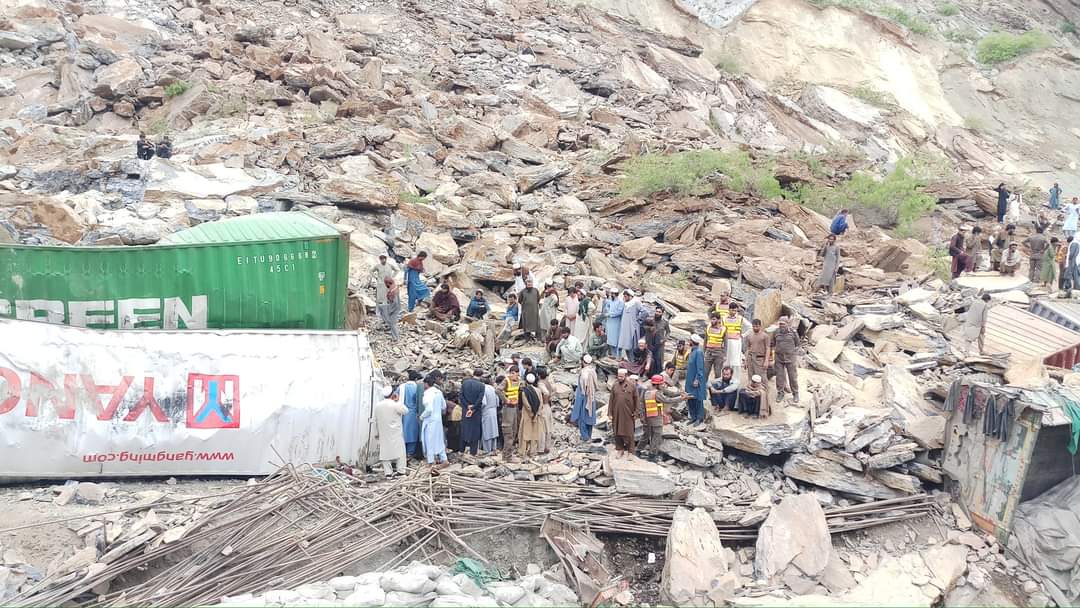
خیبر: طورخم بارڈر کے قریب پہاڑی تودہ نیچے آگرا، تودہ گرنے کے باعث بھاری گاڑیاں پھنس گئیں
صبح 2:30 بجےطورخم بارڈر،ضلع خیبر پرلینڈ سلائیڈنگ ہوئی۔ جس کے نتیجے میں تقریباً 15 سے20 کارگو گاڑیاں لینڈ سلائیڈنگ کے نیچے دب گئیں۔پاکستان آرمی، ریسکیو 1122 اور ضلعی انتظامیہ ریسکیو آپریشن میں مصروف ہیں۔
مشکل کی اس گھڑی میں پاک فوج عوامی خدمت میں پیش پیش۔ طُورخم ، خیبر پختونخواہ میں شدید طوفانی بارشوں اور آسمانی بجلی کے باعث آنے والی لینڈ سلائیڈکی اطلاع ملتے ہی آرمی کی ریسکیو ٹیمیں متحرک ہو گئیں۔
آرمی انجینئرز کے متعدد ڈمپرز، ڈوزر اور دیگر آلات و مشینری متاثرہ علاقے میں پہنچ گئے۔ اس کے علاوہ پاک آرمی کی اربن سرچ اینڈ ریسکیو ٹیموں نے اپنے مخصوص سرچ کیمروں، ریسکیو ریڈار، کٹرز، اور لائف لوکیٹرز سے امدادی سرگرمیوں کا آغاز کر دیا۔
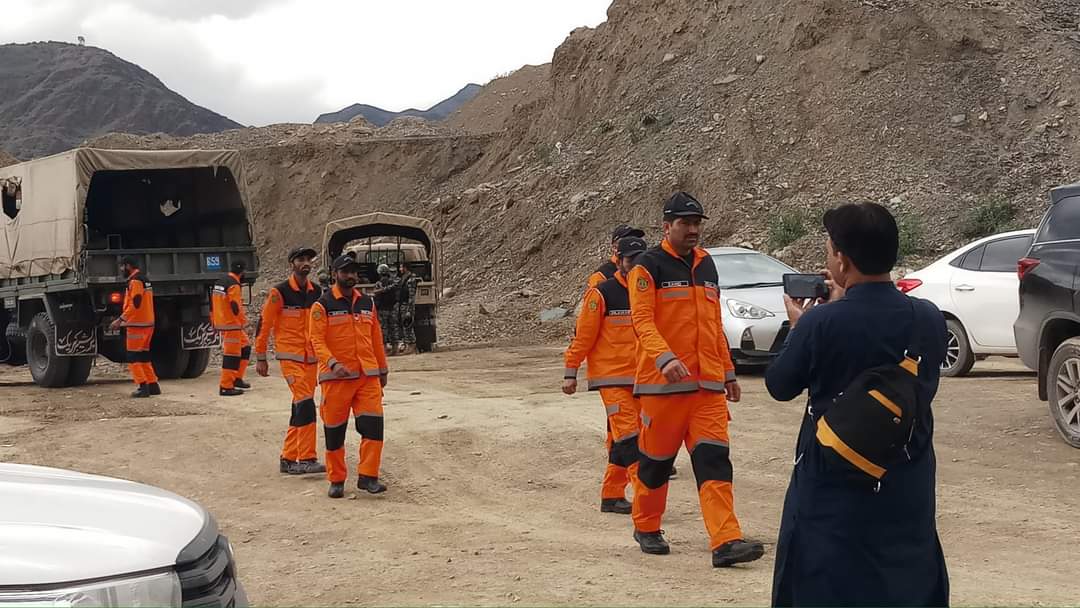
اب تک کنٹینرز ملبے تلے دب گئے 1شخص کی لاش کو مقامی افراد اور ریسکیو 1122 ٹیم نے 9 گھنٹے بعد نکال لیا جبکہ 8 زخیموں کو بھی ہسپتال منتقل کردیا گیا ہے۔ریسکیو 1122 ایمبولینس نے جاں بحق شخص کی میت لنڈی کوتل ڈسٹرکٹ ہیڈ کوارٹر ہسپتال منتقل کر دی جہاں پر لواحقین کو حوالے کر دی جائے گی۔
خیبر، پشاور، نوشہرہ، چارسدہ اور مردان کی ریسکیو ٹیمیں سرچ آپریشن میں حصہ لے رہی ہیں۔ ریسکیو 1122 کی 12 ایمبولینسز، 4 فائر وہیکلز، 3 ریکوری وہیکلز اور 3 ہیوی ایکسویٹر حصہ لے رہے ہیں۔




